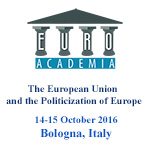Euroacademia Conferences
 Europe Inside-Out: Europe and Europeanness Exposed to Plural Observers (9th Edition) April 24 - 25, 2020
Europe Inside-Out: Europe and Europeanness Exposed to Plural Observers (9th Edition) April 24 - 25, 2020 Identities and Identifications: Politicized Uses of Collective Identities (9th Edition) June 12 - 13, 2020
Identities and Identifications: Politicized Uses of Collective Identities (9th Edition) June 12 - 13, 2020 8th Forum of Critical Studies: Asking Big Questions Again January 24 - 25, 2020
8th Forum of Critical Studies: Asking Big Questions Again January 24 - 25, 2020 Re-Inventing Eastern Europe (7th Edition) December 13 - 14, 2019
Re-Inventing Eastern Europe (7th Edition) December 13 - 14, 2019 The European Union and the Politicization of Europe (8th Edition) October 25 - 26, 2019
The European Union and the Politicization of Europe (8th Edition) October 25 - 26, 2019 Identities and Identifications: Politicized Uses of Collective Identities (8th Edition) June 28 - 29, 2019
Identities and Identifications: Politicized Uses of Collective Identities (8th Edition) June 28 - 29, 2019 The European Union and the Politicization of Europe (7th Edition) January 25 - 26, 2019
The European Union and the Politicization of Europe (7th Edition) January 25 - 26, 2019 7th Forum of Critical Studies: Asking Big Questions Again November 23 - 24, 2018
7th Forum of Critical Studies: Asking Big Questions Again November 23 - 24, 2018 Europe Inside-Out: Europe and Europeanness Exposed to Plural Observers (8th Edition) September 28 - 30, 2018
Europe Inside-Out: Europe and Europeanness Exposed to Plural Observers (8th Edition) September 28 - 30, 2018 Identities and Identifications: Politicized Uses of Collective Identities (7th Edition) June 14 - 15, 2018
Identities and Identifications: Politicized Uses of Collective Identities (7th Edition) June 14 - 15, 2018
Politicisation of the EU During European Crises – Example of the German Post-Communist Left
-
-

-
Presentation speakers
- Andreas Goffin, Institute of International Area Studies, Charles University Prague
- Download presentation
Abstract:
In the times of the recent crises the salience of the EU/ European issues is comparably high. On EU level decisions are taken and institution-like bodies (e.g. the TROIKA or ESM) are established. Certainly this creates feedback loops to the national level and there parties are still one of the most important actors. So from interest is if this has an indirect influence on parties or party systems. Not only a politicization of EU issues is likely but also a new cleavage orientating among European policies might arrive. This paper is concerned with the radical and its reaction on the three recent crises: The Euro Crisis, The Ukraine conflict and the Refugee crisis. Here the German party Die Linke is examined. The party is from interest because it presented in all of the crises rather views off the main stream. Additionally the party is at least a soft Eurosceptic one and presents itself as anti-capitalistic. Politically isolated on national level the party might see the crises as a chance for gaining more public support of its ideas. It is important to take a closer look on the radical left and not only on radical/populist right parties. In Europe, e.g. in Greece SYRIZA or PODEMOS in Portugal, radical left parties were able to use the new cleavage among to gain an important position within the political system. This might gave an incentive to Die Linke to transfer ideas or policies from them. In the center of the analysis is the question how the party responded to the crisis and used them. It should also be considered if the decisions taken on European level are pushing the party to new programmatic ideas or policy proposals. In order simplify it the paper is concerned with the politicization of the EU within the party.
-
Related Presentations

Fiscal Consolidation, Shadow Economy and the Sustainability of Private Consumption: Further Evidence from Selected Eurozone Economies
- Ioannis Kostakis
- Eleni Theodoropoulou













